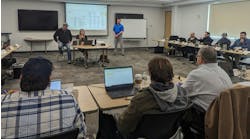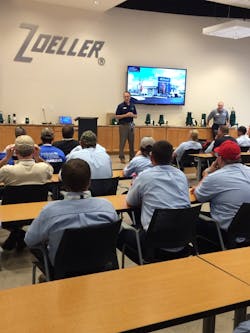Plumbing contractors today are bombarded by new technology and ideas -- in the software they use in the office, in the apps they use on their mobile devices, and in the products they install and service. This series of articles will explain why training is critical for plumbing contractors in order to be competitive, successful and able to grow their businesses.
The bread and butter of a contractor’s business are repeat customers. To keep existing clients from calling another company, plumbing contractors must create an exceptional customer experience that exceeds expectations — from the time the client’s call is answered to the follow-up after the work is completed.
A happy customer can refer friends, family and neighbors — a contractor’s best marketing tool. A dissatisfied customer can post bad reviews and dissuade potential customers from using your services. While home services businesses may have initial training for new employees, it’s critical for owners to provide options for continual training on a variety of issues that affect the success of the company.
“The world and industry are constantly changing,” says Cindy Sheridan, CAE, COO of the PHCC Educational Foundation, which administers the training programs of the Plumbing-Heating-Cooling Contractors — National Association (foundation.phccweb.org). “Association training can help members stay on top of the changes, learn what is working and what’s not when it comes to technology, businesses processes, marketing and management.”
Industry associations endeavor to provide the information their members need to be successful. Some are adept at teaching technical skills while others focus on business management skills.
“I believe everybody should always be training,” says Eric Howarth, vice president of contractor services at the Electric & Gas Industries Association (www.egia.org/cbs). “Even the largest contractors we work with out there in the marketplace find tidbits that teach them all the time because we're always learning and growing.”
When it comes to technical skills training, PHCC’s training program for plumbing and HVAC apprentices is well-respected in the industry. At the end of each year of a four-year program, students undergo a series of assessment tests to evaluate their knowledge. The educational program consists of:
• A curriculum approved by the U.S. Department of Labor, which is used by PHCC chapters and individual employers who have in-house training programs;
• Eight textbooks published by Cengage Learning (four plumbing and four HVACR); and
• Four plumbing and four HVAC online courses (using the DOL-approved curriculum) designed for use by apprentices who need a nontraditional method of receiving their instruction. Each eLearning course is the equivalent of one year of classroom instruction. Sheridan says online apprentice training is approved in 14 states and several more are pending.
PHCC also understands the advantages of hands-on education, so it encourages apprentices to test their skills against others in their field.
“We host annual national plumbing and HVAC apprentice contests at [our annual convention] CONNECT and operate the national SkillsUSA plumbing contest,” she says. “Not only do these competitions showcase the skills of our trade but they are a learning experience for the students/apprentices.”
She added that SkillsUSA 2017 students toured Zoeller Company this year, and during this year’s convention, plumbing and HVAC apprentices will go to Milwaukee Tool for a demonstration. Manufacturers see the benefit of partnering with industry associations in order to raise the bar on training and ensure that new entrants into the plumbing trades have the tools they need to succeed in their craft.
“PHCC is committed to growing the next generation of trades professionals through its efforts with SkillsUSA,” says Mark Huntebrinker, director of marketing and sales at Zoeller Company. “We at Zoeller find PHCC’s program to be first-rate, and its philosophy about hands-on learning to be in line with our own.”
SkillsUSA (www.skillsusa.org) is a partnership between students, teachers and industry to ensure that America has a skilled workforce for 130 technical trades. It serves more than 335,000 students and instructors each year. The SkillsUSA Championships, held each June, are competitive events showcasing the best career and technical education students in the nation in areas such as plumbing, HVACR, building maintenance, engineering and other STEM careers.
During the 2017 SkillsUSA Championships, PHCC Educational Foundation staff took SkillsUSA plumbing students, sponsors and staff to Louisville, Ky.-based Zoeller Company for a plant tour and education sessions in the company’s new Center For Excellence training facility. Photo credit: PHCC Educational Foundation
Louisville, Ky.-based Zoeller first partnered with SkillsUSA in 2015 when the group moved its national competition to Louisville, Huntebrinker explains. Company staff taught a class during the event and provided some of the lift station parts for the plumbing competition. The relationship continued the following year with Zoeller sponsoring a plumbing contestant.
Conversations led to planning a full tour and product demonstration in 2017 for all plumbing competitors, their sponsors and the plumbing staff at Zoeller’s new Center For Excellence training facility.
“We had about 80 participants for a half day,” Huntebrinker says. “We hope the experience of seeing pumps being built in our facility and the demonstrations of the way the products work will stay with these young people as they enter the industry, providing them with a greater understanding of this area in plumbing.”
Business Skills are Important, too
Taking a different approach to training, EGIA emphasizes business skills knowledge that contractors need to keep their workers productive and their companies profitable.
“Many contractors focus their training efforts on the technical side,” Howarth notes. “What we bring to them is the leadership side, the financials, basic pricing — the things they need to know to bring their businesses to the next level. How do you price to be profitable and take care of your customers so you're there for them in the future? How do you close more sales, to be more effective?”
EGIA developed its Contractor University, which is chock full of industry experts to help HVAC contractors increase productivity and profitability.
EGIA’s Contractor University holds two-day training sessions around the country to teach owners of HVACR companies how to make, and keep, their business profitable. Here, business expert Ellen Rohr talks to contractors in St. Louis. Photo credit: Electric & Gas Industries Association
Education programs focus on technician communications in selling, marketing and branding, lead generation, residential service agreements, service operations and management, as well as customer service principles and dispatching.
For technicians unable to attend daytime training sessions, EGIA worked with manufacturers and distributors around the country to develop an online training tool built around 10 core principle programs. “Technicians go through a question and answer curriculum that teaches the basic building blocks of being a contractor, with the ability to ask questions of some of the best people in the business,” he says.
Acknowledging that hands-on education is an important part of the learning process, EGIA holds in-person training classes throughout the country to complement the online classes.
“Mirroring the online training with the in-person training gives contractors the chance to get their questions answered, to role play, to do real workbook stuff they may not have been motivated to do,” he says. “In a classroom, that's their time away to really focus on themselves and training to grow their company.”
Technicians are the conduit between the plumbing and heating contractor and the client to provide an exceptional customer experience. Industry associations can provide specialized training and continuing education courses to keep your employees at the top of their game.
“Today’s customers are more knowledgeable,” Sheridan notes. “Well-trained employees can differentiate your business from your competitors.”
Howarth agrees: “Continued training puts contractors in the right business state to make good business decisions so they can be around to service their customers in the future. And it helps them serve their customers better by helping them make good decisions.”




